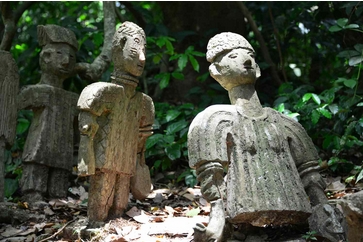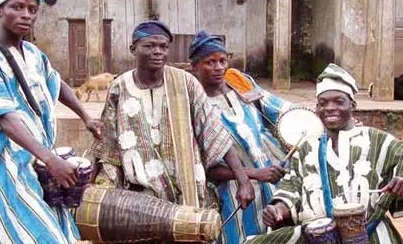
support@yorubalibrary.com
+2348073529208, 07038599574

Music is an essential component of Yoruba spiritual practices, where it serves as a conduit between the physical and spiritual realms. In Yoruba culture, music is deeply rooted with religious rituals, ceremonies, and celebrations. This article explores the role of music in Yoruba spiritual practices, highlighting its significance in facilitating communication with deities, enhancing rituals, and fostering community connections.
Music as a Spiritual Conduit
In Yoruba spirituality, music is believed to possess the power to transcend the physical world and connect individuals with the divine. It is used to invoke spirits, honor deities, and facilitate communication with ancestors. The rhythmic beats, chants, and melodies are considered sacred, enabling worshippers to enter a spiritual state and engage with the unseen forces that govern their lives.
Invocation of Orishas
Orishas, the deities in Yoruba religion, are central to spiritual practices. Each Orisha is associated with specific songs and rhythms that are used to invoke their presence during rituals. Music plays a crucial role in calling upon these deities, expressing devotion, and seeking guidance and blessings.
• Bata Drumming:
This traditional drumming style is used to communicate with Orishas. Each drum pattern corresponds to a specific deity, creating a spiritual connection through rhythm and sound.
• Oriki:
These are praise poems or songs dedicated to the Orishas, ancestors, or individuals. Oriki are performed with music to honor and invoke the presence of divine entities.
Enhancing Rituals and Ceremonies
Music enhances the efficacy and impact of Yoruba rituals and ceremonies. It sets the tone, guides the proceedings, and creates an atmosphere conducive to spiritual engagement. From birth and marriage ceremonies to initiation rites and funerals, music is integral to the expression of cultural and spiritual identity.
Ritual Structure and Flow
Music provides structure and flow to rituals, guiding participants through different stages of the ceremony. It signals transitions, marks important moments, and facilitates the movement of energy within the ritual space.
• Egun Ceremonies:
These ceremonies honor the ancestors and involve music and dance to celebrate their legacy. The rhythmic drumming and songs invite the presence of ancestral spirits, allowing participants to commune with their forebears.
Spiritual Healing and Transformation
Music is also used as a tool for spiritual healing and transformation. It aids in cleansing negative energies, restoring balance, and promoting inner peace. The therapeutic power of music is harnessed to facilitate personal growth and spiritual development.
Fostering Community and Connection
Music in Yoruba spiritual practices serves to unite individuals and foster a sense of community. It strengthens social bonds, promotes cultural continuity, and reinforces collective identity. Through communal singing, dancing, and drumming, participants experience a shared sense of purpose and belonging.
Community Drumming Circles
Drumming circles are common in Yoruba communities, providing a space for individuals to come together and engage in rhythmic expression. These gatherings promote social cohesion, enhance communication, and create a sense of unity among participants.
Cultural Preservation
Music is a vital tool for preserving and transmitting cultural knowledge and traditions. Through songs, stories, and performances, Yoruba music keeps cultural heritage alive, passing down wisdom and values from generation to generation.
Conclusion
Music plays a vital role in Yoruba spiritual practices, serving as a bridge between the physical and spiritual realms. It enhances rituals, facilitates communication with the divine, and fosters community connections. By embracing the power of music, Yoruba culture continues to celebrate its rich spiritual heritage and maintain its connection to the sacred. Through song and rhythm, the Yoruba people preserve their spiritual traditions, ensuring they remain a vibrant and integral part of their cultural identity.

The unique styles of Yoruba Bata and Dundun dances…

The emergence of new age social media and impact i…